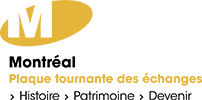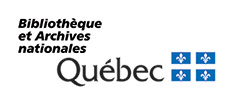Presentation by Colleen Beard
Presentation by Diane Mercier
Presentation by Marcel Fortin
Links mentioned during the discussion
Discussions on the regulatory framework governing the use of available sources, given the shift towards open data, and the intellectual property of data created as part of HGIS projects.
- Session moderator: Marcel Fortin (University of Toronto)
Presentation by Colleen Beard (Brock University)
This presentation highlighted the cooperative relationship between librarians and researchers, particularly with regard to research data management and sharing.
The library as data producer
Libraries are increasingly producing historical GIS-ready data. For example, they are digitizing and vectorizing many of their maps and launching initiatives like the REHA at the Trent University library. They are also working with government agencies and other libraries to improve collections and supplement data. Most libraries would like to promote the idea of having their data re-used by researchers and the general public alike.
The library as research assistant
The vast majority of research data in Canada is being lost. Researchers rarely have the skills required to manage and prepare their data. Therefore, they must not hesitate to call on data management specialists like librarians, for example, who are capable of helping them understand how to manage spatial data and thus facilitate visualization. Offering open access to research data could also ensure their preservation.
The library as RDM specialist
Universities are starting to take responsibility for managing research data. However, researchers lack incentive to share their data. Furthermore, there are few tools for and little expertise in research data management and archiving, and this deficiency is even more noticeable when it comes to spatial data. Libraries are taking the lead in data management and open access.
Presentation by Diane Mercier (City of Montreal)
The goal of this presentation was to review the various types of so-called “open” licenses and explain the concept of open data.
Open knowledge
According to Diane Mercier, open knowledge is “made up of data and content that can be used, reused and redistributed.”
Issue
There has been a proliferation of so-called “open” licenses, which are difficult to understand and unfamiliar to legal departments. We are currently in the process of interpreting these open data licenses. Several such licenses are available, such as the Creative Commons or ODbL (Open Database License). In addition, some products, like OpenStreetMap, hold different licenses for different components, such as images and data, for example.
For the new version of its license, the City of Montreal has looked to the Creative Commons 4.0 license for inspiration. The City is trying to simplify the new version to facilitate sharing with other Quebec open data portals. The international version of CC 4.0 has been accepted by the Open Knowledge Foundation since November 2013. This organization determines whether proposed licenses are truly open.
What’s next
To facilitate the reuse and sharing of data and enhance their value, everyone must use  open data formats and the same licenses. There should also be fewer of these licenses, and they must be simplified.
Presentation by Marcel Fortin (University of Toronto)
Presentation of observations on open data, licensing and access to data, particularly historical GIS data.
Open data
Academics are not getting involved in the open data movement, even though they are creators of data. In addition, historical data is not a focus of this movement. The culture must change and researchers must make their voices heard.
Licenses
Licenses can be confusing. For example, the license for a given product may change over time, or a data set could be the subject of several licenses.
Since licenses create obligations for users, users must pay close attention and clearly understand any license before using it. This is even more important if they are hoping to share the data.
Copyright
When one creates an original work, one is immediately given copyright over this work. Although data are not copyrightable, data packaging (e.g. software) is copyrightable.
The Canadian Copyright Act was already confusing and is now even more so since the passage of Bill C-11, An Act to amend the Copyright Act, in 2011. For example, Canadians have no rights with regard to the data created by the federal government (Crown Copyright).
Unanswered questions…
Should the historical GIS community embrace open data? If so, to what extent? At the very least, we must ensure that creators and contributors are identified and that intellectual property is respected.
Links mentioned during the discussions
- Open Knowledge Foundation, Open Data: http://okfn.org/opendata/
- City of Montreal Open data portal: http://donnees.ville.montreal.qc.ca/
- Creative Commons, Press release: Creative Commons launches Version 4.0 of its license suite: http://creativecommons.org/weblog/entry/40935
- Creative Commons, Attribution 4.0 International: http://creativecommons.org/licenses/by/4.0/legalcode
- Creative Commons, Attribution-ShareAlike 4.0 International: http://creativecommons.org/licenses/by-sa/4.0/legalcode
- French Translation of CC 4.0: https://www.transifex.com/projects/p/CC/language/fr/
- Samuelson-Glushko Canadian Internet Policy and Public Interest Clinic (CIPPIC): https://www.cippic.ca/
- OpenStreetMap: http://www.openstreetmap.org
- S.I.Lex‚ÄĮ, Deux enjeux strat√©giques dans la nouvelle version 4.0 des Creative Commons¬† : Open Data et clause non-commerciale, 2013: http://scinfolex.com/2013/11/30/deux-enjeux-strategiques-dans-la-nouvelle-version-4-0-des-creative-commons-open-data-et-clause-non-commerciale/
- Open Knowledge Foundation Blog, Creative Commons 4.0 BY and BY-SA Licenses Approved Conformant with the Open Definition, 2014:  http://blog.okfn.org/2014/01/08/creative-commons-4-0-by-and-by-sa-licenses-approved-conformant-with-the-open-definition/
- [OSM-legal-talk], About CC-4.0 and ODbl, 2013: https://list.openstreetmap.org/pipermail/legal-talk/2013-October/007640.html
- Open Data Ottawa: http://opendataottawa.ca/
- NYC Data Mine, Terms of Use: http://www.nyc.gov/html/datamine/html/data/terms.html?dataSetJs=raw.js&theIndex=24
- Open Data Commons Open Database License (ODbL): http://opendatacommons.org/licenses/odbl/
- Hickling Arthurs Low: http://www.hal.ca/
- CIPPIC Licensing Information Project for Open Licenses: http://clipol.org/
- Canadian Federal Crown Copyright: http://www1.uwindsor.ca/law/library/canadian-federal-crown-copyright
- Government of Canada Publications, Crown Copyright and Licensing: http://publications.gc.ca/site/eng/ccl/index.html





